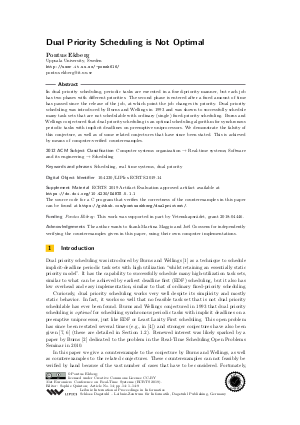Dual Priority Scheduling is Not Optimal
Author Pontus Ekberg
-
Part of:
Volume:
31st Euromicro Conference on Real-Time Systems (ECRTS 2019)
Part of: Series: Leibniz International Proceedings in Informatics (LIPIcs)
Part of: Conference: Euromicro Conference on Real-Time Systems (ECRTS) - License:
 Creative Commons Attribution 3.0 Unported license
Creative Commons Attribution 3.0 Unported license
- Publication Date: 2019-07-02
File

PDF
LIPIcs.ECRTS.2019.14.pdf
- Filesize: 443 kB
- 9 pages
Document Identifiers
Subject Classification
ACM Subject Classification
- Computer systems organization → Real-time systems
- Software and its engineering → Scheduling
Keywords
- Scheduling
- real time systems
- dual priority
Metrics
- Access Statistics
-
Total Accesses (updated on a weekly basis)
0PDF Downloads0Metadata Views
Abstract
In dual priority scheduling, periodic tasks are executed in a fixed-priority manner, but each job has two phases with different priorities. The second phase is entered after a fixed amount of time has passed since the release of the job, at which point the job changes its priority. Dual priority scheduling was introduced by Burns and Wellings in 1993 and was shown to successfully schedule many task sets that are not schedulable with ordinary (single) fixed-priority scheduling. Burns and Wellings conjectured that dual priority scheduling is an optimal scheduling algorithm for synchronous periodic tasks with implicit deadlines on preemptive uniprocessors. We demonstrate the falsity of this conjecture, as well as of some related conjectures that have since been stated. This is achieved by means of computer-verified counterexamples.
Cite As Get BibTex
Pontus Ekberg. Dual Priority Scheduling is Not Optimal. In 31st Euromicro Conference on Real-Time Systems (ECRTS 2019). Leibniz International Proceedings in Informatics (LIPIcs), Volume 133, pp. 14:1-14:9, Schloss Dagstuhl – Leibniz-Zentrum für Informatik (2019)
https://doi.org/10.4230/LIPIcs.ECRTS.2019.14
BibTex
@InProceedings{ekberg:LIPIcs.ECRTS.2019.14,
author = {Ekberg, Pontus},
title = {{Dual Priority Scheduling is Not Optimal}},
booktitle = {31st Euromicro Conference on Real-Time Systems (ECRTS 2019)},
pages = {14:1--14:9},
series = {Leibniz International Proceedings in Informatics (LIPIcs)},
ISBN = {978-3-95977-110-8},
ISSN = {1868-8969},
year = {2019},
volume = {133},
editor = {Quinton, Sophie},
publisher = {Schloss Dagstuhl -- Leibniz-Zentrum f{\"u}r Informatik},
address = {Dagstuhl, Germany},
URL = {https://drops.dagstuhl.de/entities/document/10.4230/LIPIcs.ECRTS.2019.14},
URN = {urn:nbn:de:0030-drops-107519},
doi = {10.4230/LIPIcs.ECRTS.2019.14},
annote = {Keywords: Scheduling, real time systems, dual priority}
}
Author Details
Funding
- Ekberg, Pontus: This work was supported in part by Vetenskapsrådet, grant 2018-04446.
Acknowledgements
The author wants to thank Martina Maggio and Joël Goossens for independently verifying the counterexamples given in this paper, using their own computer implementations.
Supplementary Materials
- ECRTS 2019 Artifact Evaluation approved artifact available at https://dx.doi.org/10.4230/DARTS.5.1.1; The source code for a C program that verifies the correctness of the counterexamples in this paper can be found at https://github.com/pontusekberg/dualpriotest/.
References
- A. Burns and A.J. Wellings. DUAL PRIORITY ASSIGNMENT: A Practical Method for Increasing Processor Utilisation. In Proceedings of the 5th Euromicro Workshop on Real-Time Systems, pages 48-53, 1993. URL: http://dx.doi.org/10.1109/EMWRT.1993.639052.
- Alan Burns. Dual priority scheduling: Is the processor utilisation bound 100%? In Proceedings of the 1st International Real-Time Scheduling Open Problems Seminar (RTSOPS), 2010. URL: https://www.cs.york.ac.uk/ftpdir/reports/2010/YCS/455/YCS-2010-455.pdf#page=9.
- Robert Davis and Andy Wellings. Dual Priority Scheduling. In Proceedings of the 16th Real-Time Systems Symposium (RTSS), pages 100-109, December 1995. URL: http://dx.doi.org/10.1109/REAL.1995.495200.
- Robert I. Davis, Liliana Cucu-Grosjean, Marko Bertogna, and Alan Burns. A review of priority assignment in real-time systems. Journal of Systems Architecture, 65:64-82, 2016. URL: http://dx.doi.org/10.1016/j.sysarc.2016.04.002.
- Pontus Ekberg and Wang Yi. Fixed-Priority Schedulability of Sporadic Tasks on Uniprocessors is NP-hard. In Proceedings of the 38th Real-Time Systems Symposium (RTSS), pages 139-146, 2017. URL: http://dx.doi.org/10.1109/RTSS.2017.00020.
- Tristan Fautrel, Laurent George, Joël Goossens, Damien Masson, and Paul Rodriguez. A Practical Sub-Optimal Solution for the Dual Priority Scheduling Problem. In Proceedings of the 13th International Symposium on Industrial Embedded Systems (SIES), June 2018. URL: http://dx.doi.org/10.1109/SIES.2018.8442075.
- Laurent George, Joël Goossens, and Damien Masson. Dual Priority and EDF: a closer look. In Proceedings of the Work-in-Progress Session of 35th Real-Time Systems Symposium (RTSS-WiP), December 2014. URL: https://hal.archives-ouvertes.fr/hal-01217433.
- Xiaozhe Gu, Arvind Easwaran, and Risat Pathan. Design and Analysis for Dual Priority Scheduling. In Proceedings of the 21st International Symposium on Real-Time Distributed Computing (ISORC), pages 164-173, 2018. URL: http://dx.doi.org/10.1109/ISORC.2018.00033.
- C. L. Liu and James W. Layland. Scheduling Algorithms for Multiprogramming in a Hard-Real-Time Environment. Journal of the ACM, 20(1):46-61, 1973. URL: http://dx.doi.org/10.1145/321738.321743.
- Mitra Nasri and Gerhard Fohler. Some Results in Rate Monotonic Scheduling with Priority Promotion. In Proceedings of the Work-in-Progress Session of the 27th Euromicro Conference on Real-Time Systems (ECRTS-WiP), pages 5-8, 2015. URL: https://people.mpi-sws.org/~mitra/papers/Nasri_WIPECRTS15.pdf.
- Risat Mahmud Pathan. Unifying Fixed- and Dynamic-Priority Scheduling based on Priority Promotion and an Improved Ready Queue Management Technique. In Proceedings of the 21st Real-Time and Embedded Technology and Applications Symposium (RTAS), pages 209-220, April 2015. URL: http://dx.doi.org/10.1109/RTAS.2015.7108444.
- Risat Mahmud Pathan. Real-Time Scheduling on Uni- and Multiprocessors based on Priority Promotions. Leibniz Transactions on Embedded Systems, 3(1):02-1-02:29, 2016. URL: http://dx.doi.org/10.4230/LITES-v003-i001-a002.
